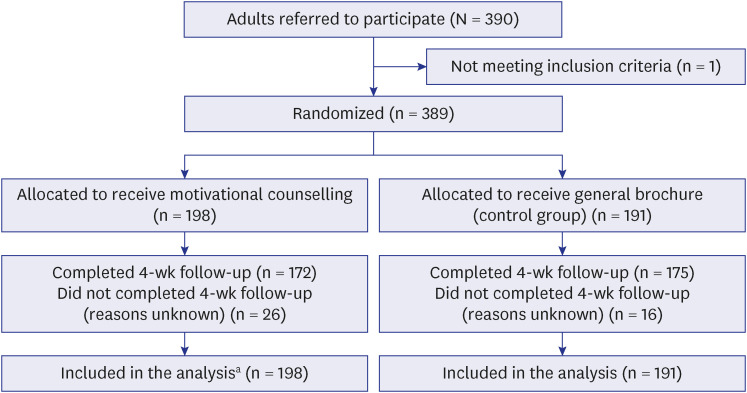J Korean Med Sci.
2023 Jun;38(25):e192. 10.3346/jkms.2023.38.e192.
Effect of a Motivational InterviewingBased Brief Intervention on Alcohol Use Behavior in Korean Internal Medicine Settings
- Affiliations
-
- 1Department of Preventive Medicine, College of Medicine, The Catholic University of Korea, Seoul, Korea
- 2Department of Psychiatry, College of Medicine, The Catholic University of Korea, Seoul, Korea
- 3Department of Social Welfare (BK21 FOUR), Jeonbuk National University, Jeonju, Korea
- 4Department of Counseling, Baekseok University, Cheonan, Korea
- 5Department of Psychiatry, Hallym University Chuncheon Sacred Heart Hospital, Chuncheon, Korea
- KMID: 2544008
- DOI: http://doi.org/10.3346/jkms.2023.38.e192
Abstract
- A motivational interviewing (MI)-based brief intervention was performed with high-risk drinking outpatients screened at internal medicine settings in Korea after the doctor advised them to reduce alcohol consumption. Participants were assigned to a MI group or a control group where they received a brochure with information on the harm of high-risk drinking and tips on managing drinking habits. Four-week follow-up results showed that Alcohol Use Disorders Identification Test-Concise (AUDIT-C) scores decreased in the MI group and the control group compared to baseline scores. The difference between groups was not significant; however, group by time interaction was significant between the two groups: the slope of decreasing AUDIT-C scores over time was greater in the intervention group than in the control group (P = 0.042). The findings suggest that short comments received from doctors might be a key component in performing brief interventions for high-risk drinking management in Korean clinical settings.
Keyword
Figure
Reference
-
1. Rehm J, Baliunas D, Borges GL, Graham K, Irving H, Kehoe T, et al. The relation between different dimensions of alcohol consumption and burden of disease: an overview. Addiction. 2010; 105(5):817–843. PMID: 20331573.2. Gao C, Ogeil R, Lloyd B. Alcohol’s burden of disease in Australia. Updated 2014. Accessed August 16, 2022. https://www.vichealth.vic.gov.au/sites/default/files/Alcohols-burden-of-disease-in-Australia.pdf .3. Jang WY, Chung WJ, Jang BK, Hwang JS, Lee HJ, Hwang MJ, et al. Changes in characteristics of patients with liver cirrhosis visiting a tertiary hospital over 15 years: a retrospective multi-center study in Korea. J Korean Med Sci. 2020; 35(29):e233. PMID: 32715667.4. Park SC, Lee SK, Oh HS, Jun TY, Lee MS, Kim JM, et al. Hazardous drinking-related characteristics of depressive disorders in Korea: the CRESCEND study. J Korean Med Sci. 2015; 30(1):74–81. PMID: 25552886.5. Organization for Economic Cooperation and Development. Health at a glance 2019 - OECD indicators. Updated 2019. Accessed August 16, 2022. https://www.oecd.org/health/health-systems/Health-at-a-Glance-2019-Chartset.pdf .6. World Health Organization. Global status report on alcohol and health 2018. Updated 2018. Accessed August 16, 2022. http://www.who.int/substance_abuse/publications/global_alcohol_report/en/ .7. Ministry of Food and Drug Safety (KR). A 2016 survey on alcohol consumption and drinking behavior. Updated 2016. Accessed August 16, 2022. http://www.mfds.go.kr/index.do?mid=675&pageNo=3&seq=33152&cmd=v .8. Statistics Korea. Causes of death statistics in 2017. Updated 2018. Accessed August 16, 2022. http://kostat.go.kr/assist/synap/preview/skin/miri.html?fn=8ddd718430667730202529&rs=/assist/synap/preview .9. National Center for Mental Health (KR). National mental health statistics 2020. Updated 2021. Accessed May 16, 2023. https://www.ncmh.go.kr:2453/viewer/skin/doc.html?fn=20211111165418134393_1.pdf&rs=/viewer/result/202305/ .10. Korean Association for the Study of the Liver. White Paper on Liver Diseases in Korea. Seoul, Korea: Korean Association for the Study of the Liver;2013.11. Jarque-López A, González-Reimers E, Rodríguez-Moreno F, Santolaria-Fernández F, López-Lirola A, Ros-Vilamajo R, et al. Prevalence and mortality of heavy drinkers in a general medical hospital unit. Alcohol Alcohol. 2001; 36(4):335–338. PMID: 11468135.12. Rosón B, Corbella X, Perney P, Santos A, Stauber R, Lember M, et al. Prevalence, clinical characteristics, and risk factors for non-recording of alcohol use in hospitals across Europe: the ALCHIMIE study. Alcohol Alcohol. 2016; 51(4):457–464. PMID: 26818195.13. World Health Organization. Brief Intervention for Hazardous and Harmful Drinking: A Manual for Use in Primary Care. Geneva, Switzerland: World Health Organization;2001.14. Kim JW, Lee BC, Kang TC, Choi IG. The current situation of treatment systems for alcoholism in Korea. J Korean Med Sci. 2013; 28(2):181–189. PMID: 23400047.15. World Health Organization. WHO Alcohol Brief Intervention Training Manual for Primary Care. Copenhagen, Denmark: World Health Organization Regional Office for Europe;2017.16. Joe KH, Chai SH, Park A, Lee HK, Shin IH, Min SH. Optimum cut-off score for screening of hazardous drinking using the Korean version of Alcohol Use Disorder Identification Test (AUDIT-K). J Korean Acad Addict Psychiatry. 2009; 13(1):34–40.17. Jung JG, Kim JS, Kim GJ, Oh MK, Kim SS. Brief insight-enhancement intervention among patients with alcohol dependence. J Korean Med Sci. 2011; 26(1):11–16. PMID: 21218023.18. Jo SJ, Lee HK, Kang K, Joe KH, Lee SB. Efficacy of a web-based screening and brief intervention to prevent problematic alcohol use in Korea: results of a randomized controlled trial. Alcohol Clin Exp Res. 2019; 43(10):2196–2202. PMID: 31386203.19. Bradley KA, DeBenedetti AF, Volk RJ, Williams EC, Frank D, Kivlahan DR. AUDIT-C as a brief screen for alcohol misuse in primary care. Alcohol Clin Exp Res. 2007; 31(7):1208–1217. PMID: 17451397.20. Kaner EF, Beyer FR, Muirhead C, Campbell F, Pienaar ED, Bertholet N, et al. Effectiveness of brief alcohol interventions in primary care populations. Cochrane Database Syst Rev. 2018; 2(2):CD004148. PMID: 29476653.21. Gentilello LM, Ebel BE, Wickizer TM, Salkever DS, Rivara FP. Alcohol interventions for trauma patients treated in emergency departments and hospitals: a cost benefit analysis. Ann Surg. 2005; 241(4):541–550. PMID: 15798453.22. Beyer FR, Campbell F, Bertholet N, Daeppen JB, Saunders JB, Pienaar ED, et al. The Cochrane 2018 review on brief interventions in primary care for hazardous and harmful alcohol consumption: a distillation for clinicians and policy makers. Alcohol Alcohol. 2019; 54(4):417–427. PMID: 31062859.
- Full Text Links
- Actions
-
Cited
- CITED
-
- Close
- Share
- Similar articles
-
- Using Motivational Interviewing in Diabetes Self-Management Education
- Motivational Interviewing for People with Diabetes Mellitus
- Core Components of Interventions for Prevention of Alcoholism in Adults: An Integrative Review
- Effect of Smoking Cessation Program for Workers in Large Size Company: Using Motivational Enhancement Counseling
- The Study on the Effect of Stage Based Exercise Motivational Intervention Program for the Elderly


